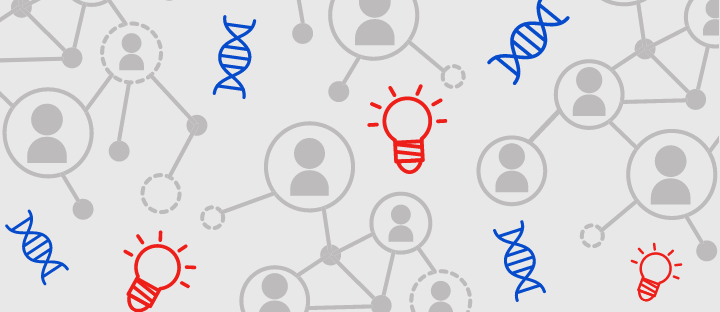KIF1A.ORG’s 14th Research Roundtable meeting, “Updates from KIF1A.ORG and Dr. Wendy Chung/Chung Lab” was presented by Dr. Wendy Chung, Dr. Lia Boyle, Dr. Michael Zuccaro, and Dr. Charles LeDuc of Columbia University. Read on to learn more about the progress the Chung Lab is making toward a better understanding of KAND and therapeutic development thanks to support from the KIF1A.ORG community.
Attendance

44 RESEARCHERS, CLINICIANS, & BIOTECH REPS

20 RESEARCH INSTITUTIONS & INDUSTRY PARTNERS/ORGS

5 KIF1A.ORG REPS
Who Is the Chung Lab?
Dr. Wendy Chung and her team at Columbia University Medical Center in New York City have been our relentless partners since the founding of KIF1A.ORG in 2017. The Chung Lab spearheads a robust preclinical KAND program, including a global patient registry and longitudinal natural history study; disease modeling with patient-derived induced pluripotent stem cells (iPSCs) and animal models; biomarker and endpoint studies; KAND severity scale and clinical disease characterization. Dr. Chung has been our clinical leader from day one, and sees many of our KAND families in her clinic. The Chung Lab’s work has drastically improved our understanding of KIF1A gene function, clinical care, and targeted strategies to develop treatments and cures for KAND. Dr. Chung also leads several collaborations within the scientific community focused on bringing treatment to families affected by mutations in KIF1A.
Summary
This meeting was presented by multiple members of the Chung Lab to review their recent progress in four key areas: our understanding of the KAND Natural History Study, KIF1A mouse models, KAND patient-derived cell lines, and KAND neuropathology.

KAND Natural History Study: The Natural History Study is crucial to advance our understanding of KIF1A Associated Neurological Disorder (KAND) and the progression of the disease, identify measurable endpoints for clinical trials, and swiftly develop strategies for treatment. Our KAND Natural History Study was launched in 2017 by the Chung Lab and is comprised of over 160 patients (and counting!) with a confirmed KAND diagnosis. This robust study of patients affected by mutations in the KIF1A gene allows the scientific community to compare cases, discover new phenotypes and re-contact families as new discoveries are made. This is one of the most foundational tools needed to prepare for upcoming clinical trials so families, scientists and regulators can identify measurable improvements in KAND symptoms as the result of new treatments. In our December 2021 Research Roundtable meeting, we heard a brief update on the cohort of patients enrolled in the Natural History study, highlighting 8 newly identified KIF1A mutations that have been added to the study since the Chung Lab published an update on this study earlier this year.
If you or a loved one has been diagnosed with a pathogenic KIF1A mutation, one of the most powerful contributions you can make to help us develop better care guidelines and discover treatment is to enroll in the Natural History Study. Click here to learn more.

KIF1A Mouse Models: Mouse models can represent human diseases and help scientists study how to treat and prevent them. Did you know that mice share 95% of human DNA? This means that mice and humans can be similarly affected by disease. As a result, by studying symptoms in mice, scientists can learn more about how to treat certain diseases. In 2017, KIF1A.ORG launched our #WeNeedAMouse campaign to establish the first KIF1A mouse model for KAND therapeutic development. Since the creation of this model, the Chung Lab has been hard at work to continue characterizing and advancing our understanding of this crucial resource. In our December 2021 Research Roundtable meeting, we received an update on KIF1A mice that were over two years old! Following and monitoring this mouse model over the course of years has revealed important discoveries, including how the mice develop and mature over time, how mobility is altered over time, and how structures in the mouse brain are different between KAND and “wild-type” (no KIF1A mutation) control mice.

KAND Patient-Derived Cell Lines: One of our newest and most utilized Tools for Development is our patient-derived induced pluripotent stem cell (iPSC) lines available from the Coriell Institute. Induced pluripotent stem cells are specialized cells that have been taken from the body (such as a blood sample) to be grown in petri dishes and then reprogrammed to develop into any type of cell. They can be used in research to understand how different diseases develop, and are used as a tool in drug development. In our KIF1A Research Network, many research teams have used this resource by turning iPSCs into neurons to answer therapeutic questions or test therapeutic options. While this resource is available through the Coriell Institute, these cell lines were first developed in the Chung Lab! Since the development of these cell lines, the Chung Lab has continued to characterize this resource in a variety of ways. In our December 2021 Research Roundtable meeting, we learned more about how these cells grow, how KIF1A cargo transport could be impaired by KIF1A mutation, and had lengthy discussions about how these cells mature over time.

KAND Neuropathology: Understanding the complexity of changes and degeneration associated with KAND and other diseases affecting the brain is essential in helping our research community target appropriate treatment options. By studying human brain tissue, researchers can make discoveries for KAND as well as other diseases. Brain tissue research is an advanced, significantly impactful research option available to scientists through the gift of brain donation. As a result of the selfless gift of brain donation from families who have lost precious loved ones to KAND, the Chung Lab is able to research these samples to help us learn more about KAND and tailor our therapeutic approaches. We are forever grateful for these families and their selfless gift.
Main Takeaways
The Chung Lab continues to be a leader in both KAND research and therapeutic development. As discussed throughout this summary, the scales and approaches of research being conducted by the Chung Lab are broad and support multiple steps on our path towards the first treatment and cure for KAND. We are beyond thankful for all of the past, present, and future work being conducted by Dr. Chung and members of the Chung Lab!


Thank you for posting this on FB. I’m glad I ran across it. I am the grandmother of a kif1A warrior. Is it possible to get on a mailing list to receive a link every time there is an update like this? If so, thank you in advance.
And thank you to Dr Chung fir her tireless work and commitment.
Hi Eve! Thank you for being part of our community. We send a monthly newsletter that includes these Research Roundtable updates. Sign up at https://www.kif1a.org/subscribe.
Many thanks!
Kat